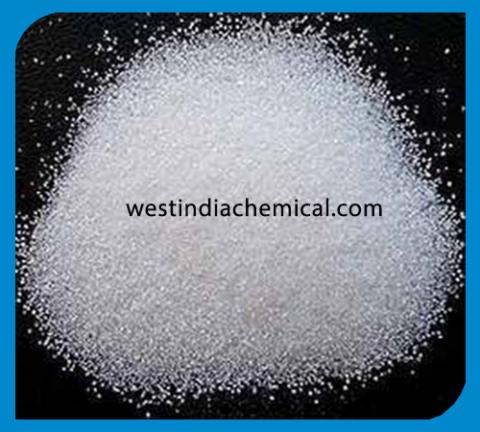Primary tabs

Sulfamic Acid LAB GRADE
SKU::RXSOL-60-1304-500
Sulfamic Descalant
Sulphamic acid can be used for removing scales obtained from water in heating and cooling systems e.g. boilers, condensers, heat exchangers, jackets and coils
Sulfamic Acid is a Zwitterion, a molecule with two charges that counteract each other, the Nitrogen and Oxygen have a greater pull on the bond pair of electrons due to the high electro-negativity, this causes the bond to be polar, the Nitrogen and Oxygen draw the electrons closer and become slightly negative, the Hydrogens become positive because the negative electrons are further away.
Grades of Sulphamic acid as a descalant:
The GP grade of Sulphamic acid:
The GP grade may be used for removing scales obtained from water in heating and cooling systems e.g. boilers, heat exchangers, condensers, jackets and coils.
The SR grade of Sulphamic acid:
This formulation is recommended for scales containing high silica. Typical examples are scales found in caustic evaporators in the Aluminum industry and black liquor evaporator in the pulp industry.
The RXSOL TM grade of Sulphamic acid: SUPERIOR BLEND of Corrosion inhibitor
This formulation is recommended for removal of scales from heat exchangers made of Titanium metal. We provide Sulfamic Acid descalant that has scale solubilizing capacity and added corrosion resistance blends which offer maximum protection to metal of equipment being cleaned. Our range of Sulfamic Acid descalant is ideal for removing scales from cooling towers, boilers, heat exchangers, coilers, condensers, and various other heating and cooling systems. We also provide Sulfamic Acid descalant in self-indicating grade that changes colors to indicate that the efficiency of material has been finished.
CHEMICAL STAGE :
A strong crystalline acid, Sulfamic Acid is also known as an intermediate compound between Sulfuric Acid (H2SO4), and Sulfamide (H4N2SO2) and a dry, non-volatile, non-hygroscopic, odorless, white crystalline, stable acid, moderately soluble in water that forms strongly acidic aqueous solution, comparable in acidity to the common strong mineral acids.
White crystalline soild, non volatile, non volatile, non hydroscopic. Soluble in water and odorless. Toxic by ingestion.
Uses: Metal and ceramic cleaning, amine sulfamates, ph control, hard water scale removal, electroplating.
At room temperatures, dilute aqueous Sulfamic Acid solution is stable for a long time but rapid hydrolysis occurs at elevated temperatures. Its solution is less corrosive toward metals than other mineral acid. When compared to most of the common strong mineral acids, Sulfamic Acid has desirable water descaling properties, low volatility, low toxicity and is a water soluble solid forming soluble calcium and iron-III salts. Because of its many positive attributes like handling ease, solubility and low corrosiveness, Sulfamic Acid is used for many diversified applications.
APPLICATIONS OF SULFAMIC ACID ---
• Used as an immersion liquid
• Used as filling with a Sulfamic acid descalant solution
• Used through circulation for consistent concentration though the closed circuit
• Used in cold as well as with temperature ranging from 40º to 60ºC
• Sulfamic Acid is a very safe and highly effective descalant
• Sulfamic Acid provides good cleaning and reduces manual cleaning.
• Sulfamic acid is recommended for the cooling water for descaling the condenser on running plant basis.
Applications Of Sulphamic Acid:
Sulphamic acid in descaling
Sulphamic Acid is super efficient descaling agent and is used for cleaning a variety of industrial equipment and domestic appliances.
Sulphamic acid in paper & pulp Industry
Sulphamic Acid prevents pulp degradation due to temperature at the chlorination and hydrochloride stage. It permits bleaching at higher temperature and lower PH without loss of strength.
Sulphamic acid is used in manufacturing of Dyes, Pigments and in the dyeing of leather
Sulphamic Acid removes excess of nitrides used in the diazotization reactions in the manufacturing of dye stuffs and pigments. Nitrides if present in process water of effluents can also be removed by using Sulphamic Acid
Sulphamic acid in Chlorine Stabilization
Chlorine gas in water form HOCL which reacts with Sulphamic Acid form N-Chloro-Sulphamic Acid to N-ChloroSufamic Acid more stable and yet has active chlorine, Because of this, Sulphamic Acid is used for stabilizing chlorine in swimming pools and cooling towers.
Sulphamic acid in Electroplating and Electro-refining
Metal sulphamate electrolytes values for their high solubility cadmium, cobalt nickle, lead silver and radium sulphamte deposits are bright and dense. Lead sulphamate is used in refining lead when a high quality is desired.
Sulphamic acid in Sulphation and Sulphamation
Sulphamic acid is used for sulphation and sulphamation of many organic compounds. Sulphation of aklyl pheno-ethylen oxide condensation products 9for detergents and sulphation of ethoxylated phenol-formaldehyde resins is preferable with Sulphamic Acid. Stronger agents cause unwanted ring sulphomation.
Sulphamic acid in the Plastic industry
Sulphamic acid finds application in the plastic wherever a curing agents is required which does not have the disadvantage of inorganic acids and which acts faster than organic acids.
DIRECTION OF USAGE
• Machines should be rinsed with water to remove loose flakes & sludge's before use
• Powder should be added to warm water for an ideal solution
• Sample should be properly tested before using
• Proper ventilation is essential for effective usage of Sulfamic Acid Descalant
• After cleansing, the solution should be drained out and the system should be rinsed with water until pH value is neutral
• Rinsing with ROTO PASS – 212 for better metal prevention and passivation is recommended
Packing of Sulphamic acid
Sulphamic Acid is available in H.D.P.E. bags of net 50 Kgs. Material. Sample packets of 100-200 gms. are supplied on request.
Advantages of using Sulphamic Acid
- Sulphamic Acid has very high shelf life.
- Sulphamic acid do not require storage/handing arrangement hence no adulteration possible.
- Sulphamic acid has very high effectivity of the descaling.
- Complete cleaning can be chemically achieved by Sulphamic acid and does not require post descaling manual cleaning.
- Sulphamic acid is safe acid, packed in 50 kgs HDPE bags and has no handling hazards.
- No storage tanks / system required for dosing.
- The solid can be directly charged to system eliminating the cost of system reduces the leave of scaling solids and acts as anti - descalant.
- Accidental excess dosing does not affect the metal of the circulating system but it acts to remove the deposited scale from the system.
-
It is recommended to does into the cooling water for descaling the condenser on running plant.
Sulfamic Acid is used for descaling.
• Sulfamic Acid is very efficient descaling agent and is widely used for cleaning a variety of industrial equipments, especially boilers, condensers, cooling tower and pipelines.
• In paper & pulp Industry, Sulfamic Acid is used to prevent pulp degradation due to temperature conditions existing at the chlorination and hydrochloride stage. Sulfamic Acid also permits bleaching at higher temperature and lowers pH without loss of strength of fiber.
• Sulfamic acid is used in manufacturing of Dyes, Pigments and in the dyeing of leather.
• Sulfamic Acid removes excess of nitrides used in the diazotization reactions in the manufacturing of dye stuffs and pigments. Nitrides, if present, in process water of effluents can also be removed by using Sulfamic Acid.
• In Chlorine Stabilization, Chlorine gas in water form HOCL which reacts with Sulfamic Acid form N-Chloro-Sulphamic Acid to N-ChloroSufamic Acid more stable and yet has active chlorine, Because of this, Sulfamic Acid is used for stabilizing chlorine in swimming pools and cooling towers.
• In Electroplating and Electro-refining, Metal sulphamate electrolytes values for their high solubility cadmium, cobalt nickle, lead silver and radium sulphamte deposits are bright and dense. Lead sulphamate is used in refining lead when a high quality is desired.
• In Solutation and Sulphamation, Sulfamic Acid is used for sulphation and sulphamation of many organic compounds. Sulphation of alkyl pheno-ethylen oxide condensation products for detergents and sulphation of ethoxylated phenol-formaldehyde resins is preferable with Sulfamic Acid. Stronger agents cause unwanted ring sulphomation.
• In the Plastic industry, Sulfamic Acid finds application in the plastic wherever a curing agent is required which does not have the disadvantage of inorganic acids and which acts faster than organic acids.
Other Applications
• Sulfamic Acid is preferred greatly to Hydrochloric Acid in household usage for its intrinsic safety value.
• Sulfamic Acid is used in the design of many types of therapeutic agents such as Antibiotics, Nucleoside/nucleotide Human immunodeficiency virus (HIV) reverse transcriptase inhibitors, HIV protease inhibitors (PIs), anti-cancer drugs (steroid sulfatase and carbonic anhydrase inhibitors), anti-epileptic drugs, and weight loss drugs.
• Sulfamic Acid is used as an acidic cleaning agent for metals and ceramics.
• It is used frequently for removing rust and limescale.
• Sulfamic Acid is used in the industrial cleaning of dairy and brew-house equipment.
• It is used as a catalyst for esterification process.
• Sulfamic Acid is used in Dye and pigment manufacturing.
• Sulfamic Acid is used as an Ingredient in Denture Tablets, Fire Extinguishing Media.
• Sulfamic Acid is used in Pulp and paper industry as a chloride stabilizer.
Sulphamic Acid Specifications :
Sulphamic Acid Based Descalants
Our high quality range of Sulfamic Acid Descalant is non hazardous & non flammable, and does not give off unbearable fumes. It’s perfect for removing scales from cooling towers, coils, heat exchangers, condensers and heating & cooling systems. Sulfamic Acid Descalant increases the efficiency of working of a plant and equipment on cooling and cleaning surfaces by removing industrial scale.
|
Structural Formula  CAS Number: 5329-14-6 IUPAC: sulfamic acid |
|
|
Melting point
|
205 Deg.C
|
|
Decomposition Temperature
|
209 Deg.C
|
|
Specific Gravity
|
2.126
|
|
Bulk Density (loose)
|
1.0 - 1.2
|
|
Bulk Density (packed)
|
1.0 - 1.6
|
|
Dissociation constant
|
0.101
|
500 Grm / 1 / 5 / 10 / 20 / 35 / 210
Sulfamic Acid LAB GRADE manufacturer supplier distributor in Mumbai, Kandla, Kolkata, Vizag, Chennai, India, Fujairah, Dubai, Sharjah, UAE, Gulf, Middle East, Muscat Oman, Kenya Africa. Get the best quality of Sulfamic Acid LAB GRADE at a competitive price from us. We have ready stock of Sulfamic Acid LAB GRADE in India, UAE Gulf, Oman, Kenya Africa. Contact us for bulk as well as small orders.
Efficiency
Rapid Softening, disintegration and dissolving of scales.
Economy
By reducing down-time, productivity is increased. by protecting metal and by uniform leaning of the surface equipment life is prolonged and performance made superior. The above information is adequate for commonly encountered problems of descaling.
Handling & Storage
Safety
• No Fumes Avoid contact with skin or eyes. Wear Cup-type, rubber or soft plastic-framed goggles, protective clothing, and rubber gloves must be worn when handling.
• Keep in a tightly closed container. Protect from physical damage.
• Store in a cool, dry, ventilated area away from sources of heat, moisture and incompatibilities.
• Containers containing this material may be hazardous when empty since they retain product residues (dust, solids); observe all warnings and precautions listed for the product.
• Ensure as low exposure as possible. Local exhaust ventilation is generally preferred as it can control the emissions of the contaminant at its source, preventing dispersion of it into the general work area.




